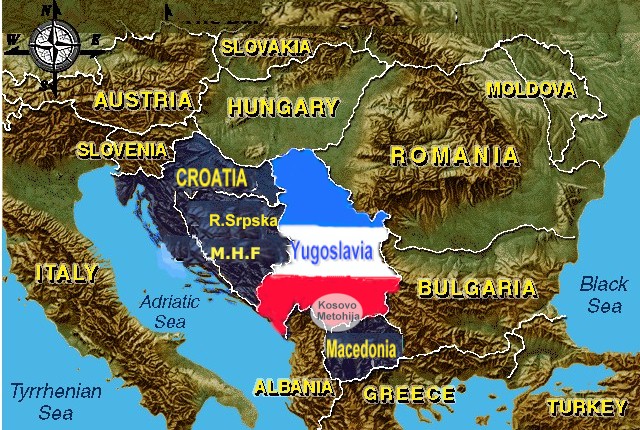![]()
 |
It is a fact the interests of the
great powers, the mighty economic, political and media
centres have always been underwritten by small nations,
those that become an obstacle to the execution of what
has been planned. The more so as their geo-strategic and
geo-political position have been at variance with the
interests of the great powers. |
| This region also
has great importance as a part of Serbia and FR
Yugoslavia. Kosovo-Metohija connects the main areas of
Serbian ethnic territories - Pomoravlje and Sumadija, the
backbone of the Serbian geo-strategic and geo-political
position; Raska, the historical seat of the Serbian
state, Montenegro and areas leading to Republika Srpska.
Without Kosovo-Metohija within Serbia, a hole would be
created in Serbian ethnic territory with a tendency of
its expansion. In all geopolitical plans of the West, dominated by the US, regarding the Balkans, the area of Kosovo-Metohija has been given priority. Namely, the diminution of Russia's influence and its share in the distribution of power in the Balkans, has remained a priority of American policy in the region. Weakening Serbia through destablization of Kosovo-Metohija and putting it in a hostile surrounding without the possibility of effective defense, would provide easier realization of this goal. Albania has a prominent role in all versions of these plans. It cuts the line of Orthodox countries that practically stretches from the Baltic to the Mediterranean, and strengthens the Islamic surrounding of Serbia, that is Yugoslavia. However, Albania is not prepared to fulfil the role assigned to it in geo-political games on the Balkans. It lacks all the resources and potentials - economic, demographic, natural and territorial. The Kosovo-Metohija region would reverse most of these disadvantages. Thus, it is clear why such strong pressure of the international community, and primarily of the US, is put on Serbia and FR Yugoslavia to accept a change of the state and legal status of Kosovo-Metohija. It is also clear why the involvement of Albania in Kosovo-Metohija developments is being ignored. Human rights, the rights of national minorities and other priorities that the US insist on are of no consequence to them. It is just a smoke screen for the pressures, designed to cover the essence of geo-political and geo-strategic interests. That is why the US refuses to acknowledge the fact that Yugoslavia ensures the rights for its national minorities, in compliance with the highest international standards. |
Copyright (C.) RJ